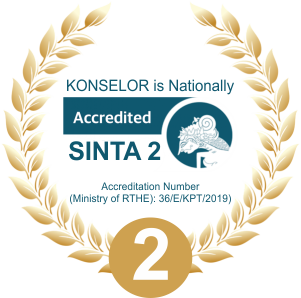Gaya Belajar Anak Homeschooling (Studi pada Keluarga Pelaku Homeschooling)
 ), Galih Fajar Fadillah(2),
), Galih Fajar Fadillah(2), (1) IAIN Surakarta
(2) IAIN Surakarta
 Corresponding Author
Corresponding Author
Copyright (c) 2017 Alfin Miftahul Khair, Galih Fajar Fadillah
DOI : https://doi.org/10.24036/02017627563-0-00
Full Text:
 Language : en
Language : en
Abstract
Homeschooling could be an education alternatives, the substance of activities of the school. The child is learns everything under control and supervise of parent. Families must have a strong commitment within the practice. This study is a qualitative phenomenological approach focused discusses a phenomenon about homeschooling. The aim of this research is to know the methods of study used in the process of teaching and learning results gained from the learning process through homeschooling. Collecting data is using the method of observation, interview and documentation. Data analysis using qualitative descriptive method and the validity of data is done by triangulation. The results are: 1) in behavioristic kids are love learning because fun and can be anywhere. Cognitively, kids can customize his ability to learn. In humanistic kids are aware to the conditions and environments around them. 2) Learning Outcome demonstrate the kids progress in cognitive, affective and psychomotor.
Keywords
References
A. Abe Saputra. (2007). Rumahku Sekolahku, Yogyakarta: Graha Pustaka.
Anas Sudijono. (2007). Pengantar Evaluasi Pendidikan, Jakarta: PT. Raja Grafindo Persada.
Bankdata.kpai.go.id/tabulasi-data.
Feist, Jess dan Feist, Gregory. (2010). Teori Kepribadian. Buku 2. Jakarta: Salemba Humanika.
Friedman, D., Hechter, M., & Kanazawa, S. (1994). A theory of the value of children. Demography, 31(3), 375-401.
Harian Koran Tempo, edisi Minggu 26 Februari 2012.
Harian Tribun Jogja, edisi Minggu Pon, 2 Oktober 2011.
Indah Hanaco. (2012). I LoveHomeschooling, segala sesuatu yang harus diketahui tentang homeschooling, Jakarta: PT. Gramedia.
Indrawani, S. N., Mailani, L., & Nilawati, N. (2014). Intensi Berhenti Merokok: Peran Sikap Terhadap Peringatan pada bungkus Rokok dan Perceived Behavioral Control. Psikologia: Jurnal Pemikiran dan Penelitian Psikologi, 9(2).
Kak Seto. (2007). Homeschooling Keluarga kak-Seto, Bandung: Kaifa.
Kunzman, R. (2009). Write these laws on your children: Inside the world of conservative Christian homeschooling. Beacon Press.
Linda Dobson. (2005). Tamasya Belajar; Panduan Merancang Program Sekolah di Rumah Untuk Anak Usia Dini, Bandung: Mizan Learning Center.
M. Ngalim Purwanto. (2007). Psikologi Pendidikan, Bandung: Remaja Rosdakarya.
Mawar, R. (2012). Efektivitas Penggunaan Media Pembelajaran E-learning Berbasis Web Pada Pelajaran Teknologi Informasi dan Komunikasi Terhadap Hasil Belajar Siswa kelas X SMA Negeri 1 Kalasan (Doctoral dissertation, Universitas Negeri Yogyakarta).
Patmonodewo, S. (2000). Pendidikan anak prasekolah. Rineka Cipta bekerjasama dengan Departemen Pendidikan & Kebudayaan.
Ratna Wilis Dahar. (2011). Teori-teori Belajar & Pembelajaran, Jakarta: Penerbit Erlangga.
Riegel, S. (2001). The home schooling movement and the struggle for democratic education. Studies in Political Economy, 65(1), 91-116.
Sandjaja, S. (2001). Pengaruh keterlibatan orang tua terhadap minat membaca anak ditinjau dari pendekatan stres lingkungan. Psikodimensia kajian ilmiah psikologi, 2(1), 17-25.
Sharpley, C. F., Bitsika, V., & Efremidis, B. (1997). Influence of gender, parental health, and perceived expertise of assistance upon stress, anxiety, and depression among parents of children with autism. Journal of Intellectual and Developmental Disability, 22(1), 19-28.
Sintha Ratnwati (ed). (2000). Keluarga, Kunci Sukses Anak, Jakarta: Penerbit Kompas.
Sudono, A. (2000). Sumber belajar dan alat permainan untuk pendidikan anak usia dini. Grasindo.
Sugiyono. (2010). Metode Penelitian Kuantitatif Kualitatif dan R&D, Bandung: CV. Alfabeta.
Sumardiono. (2007). Homeschooling A Leap For Better Learning, Lompatan Cara Belajar, Jakarta: PT. Gramedia.
 Article Metrics
Article Metrics
 Abstract Views : 1731 times
Abstract Views : 1731 times
 PDF Downloaded : 510 times
PDF Downloaded : 510 times
Refbacks
- There are currently no refbacks.
Copyright (c) 2017 Alfin Miftahul Khair, Galih Fajar Fadillah

This work is licensed under a Creative Commons Attribution 4.0 International License.







